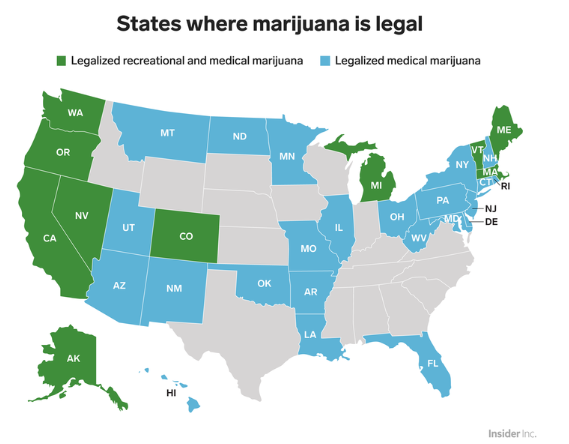How to Handle Marijuana in the Workplace
Weed at work might sound like a funny or dangerous topic to cover in HR, but we know HR professionals are on the front line of dealing with all kinds of challenges in a modern workplace:
- Managing the opioid crisis
- Helping employees who are struggling with mental health
- The suicide epidemic in construction and agriculture
- Gun violence threats in the workplace
And of course, how to deal with changing state-to-state regulations over marijuana and cannabis products.
Legal Overview: Although marijuana is illegal on the federal level, 10 states have made recreational marijuana use legal. That dichotomy makes the subject murky. In addition, 33 states have legalized medical marijuana. (Source: Business Insider)
So, what’s an HR person to do?

If using pot recreationally or medicinally isn't prosecuted by federal and state law enforcement, how does that impact the workplace, drug testing and employee handbooks? We’ve got some things to consider as you grapple with the subject.
1. Put Safety First
Employees who test positive for marijuana have 55% more industrial accidents and 85% more injuries than those who test negative for the drug. - SHRM
According to the National Institute of Drug Abuse, after alcohol, marijuana is the second most commonly found drug in the blood of drivers involved in a crash. The drug can slow reaction time, impair judgment of time and distance and decrease coordination. These don’t sound like the characteristics of an ideal worker, does it? Especially if you’re in a highly physical industry, such as construction, trucking, manufacturing or warehouse logistics.
Regardless of the legality of marijuana in your state, make this clear to workers: Safety is a priority, and being high is not appropriate when working. Make a clear rule, and stick to it.
The Takeaway: Employers need to take steps to keep their workers, their customers, their work environment and the public safe. They need to look at possible impacts of drug use in every employee position and assess those risks to their businesses.
2. Medical vs. Recreational Marijuana Use
According to SHRM, there are no laws that require employers to accommodate a worker who is using marijuana, prescription or not. However, that issue is getting more complicated. As tricky legal questions work their way through different state courts - and come out with different rulings - the only thing getting clearer in the United States is that without a federal law, the legality of marijuana and its use in the workplace continues to be a “gray area.”
Some things to think about:
- Recreational Use: Employers can require employees to come to work unimpaired from the use of marijuana (similar to the expectation around alcohol).
- Prescription Use: As a federally illicit drug, marijuana is not covered by the ADA; however, some employees have found some success in state courts by arguing employers should accommodate them as they would for an ADA-related claim..
- Across State Lines: If your company operates in multiple states, a universal marijuana policy will be hard to follow.
The Takeaway: There’s no clear answer, but Lauraine Bifulco, HR President at Vantaggio, who spoke about the issue at the March 2019 SHRM Employment Law & Legislative Conference, recommends employers:
- Treat medically prescribed marijuana similar to accommodations you would make for other ADA-qualified issues
- Make the workplace a marijuana-free place, both of the drug itself and its influence
- Keep safety the priority and allow for testing when inappropriate use is suspected
3. Drug Testing: Firing or Not Hiring Someone Based on Marijuana Positivity
If recreational marijuana is legal in your state, remember that it’s still illegal at the federal level. Again, welcome to the gray area.
According to an SHRM article, “State Legalization of Marijuana Presents Thorny Issues for HR,” states that have legalized recreational marijuana fall into two categories:
- Those that allow employers to continue a zero-tolerance policy based on federal law.
- Silence about how employers should respond to employees’ use of the drug outside of work.
One example of decisive action is Maine, where recreational use is legal. Maine’s 2018 law prevents employers from discriminating against people who have used cannabis. Going furthur, a New York City bill that passed the city council last week would prohibit employers from testing applicants for marijuana use at all, though if a worker appeared to be under the influence on the job, employers could test for it.
The Takeaway: Drug testing has been losing ground in many industries, but one thing is the same: employees need to be work-ready, and that means not under the influence of drugs.
4. Comparing Marijuana and Alcohol isn't Apples to Apples
In many ways, the legalization of marijuana is a parallel to alcohol use in the United States:
- Both used to be prohibited
- Both impact users physically and mentally
- Both can create dangerous situations in a workplace
- Effects of both last for short time periods, such as one to three hours for marijuana, according to the National Institute of Drug Abuse
One major difference is in testing: Most drug screens can detect marijuana in the body for days or even weeks after use, so determining if a person was under the influence of marijuana at a specific time - such as after an accident - is difficult.
The Takeaway: Drug screening and drug use policies are at a moment of flux. Trends point to a more limited use of them and to limiting what’s being tested for, and many companies are giving their zero-tolerance or off-the-clock policies another look.
Marijuana in the workplace across the United States will continue to stress out HR professionals. It impacts every facet of their job, from hiring and job performance to absenteeism and safety. Continue to manage this subject with compassion, an open mind and an ear tuned to the legal system. If you want extra guidance, consider integrating a convenient legal service into your organization. myHRcounsel™, a BirdDogHR partner, provides legal services as needed - no retainer, just legal advice when you need it.





